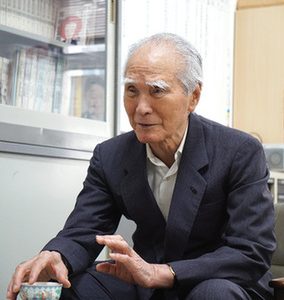After retiring, Tomiichi Murayama returned to his hometown of Oita and lived a carefree life. He passed away at the ripe old age of 101. I still remember the image of this good-natured old man on television nearly 10 years ago, cycling around his neighborhood.
In 1994, he was elected prime minister as leader of the Socialist Party in the LDP-Sakigake coalition government. He aligned himself with the LDP, proclaiming the "constitutionality of the Self-Defense Forces" and "firmly upholding the Japan-US Security Treaty," seemingly abandoning the Socialist Party's role as a counterweight to the US-controlled LDP politics. However, at the time, its support base, Sohyo, was absorbed into the government-controlled union federation Rengo and dissolved. The privatization of both the Japanese National Railways and Nippon Telegraph and Telephone almost completely destroyed the Socialist Party's support base. Furthermore, with the collapse of the Soviet Union and disillusionment with Communism, it was widely believed that the Socialist Party's reason for existence had vanished.
Foreseeing the state of the SDP that would become a successor to it today, on the brink of extinction, Murayama took a gamble of all his might, that is, the once-in-a-lifetime gamble of publishing the Statement on 50 Years Since the End of the War .
 China Central Television (CCTV) interviewed former Prime Minister Murayama Tomiichi in January 2015. (Photo) Before the Abe Statement was released in August of that year , China expressed concern that "Prime Minister Abe had said he would erase the words 'colonial rule' and 'aggression' and change the Murayama Statement." Murayama responded as follows:
China Central Television (CCTV) interviewed former Prime Minister Murayama Tomiichi in January 2015. (Photo) Before the Abe Statement was released in August of that year , China expressed concern that "Prime Minister Abe had said he would erase the words 'colonial rule' and 'aggression' and change the Murayama Statement." Murayama responded as follows:
"That's impossible. Statements are international agreements. The Murayama Statement not only showed the path Japan should take, but also served as a pledge to the world. It cannot be changed or amended . Other countries will wonder, 'What is Japan thinking? What does it want?' That will lead to a decline in Japan's credibility. Prime Minister Abe has said he will issue a new statement, but considering all factors, it is unlikely that the Murayama Statement will be changed."
In his Diet responses, Abe has denied any aggression against China, following the advice of a Japanese scholar in his government's pocket that "the definition of aggression has not been established (in historical studies) ." However, the content of Abe's 2015 speech was, in a roundabout way, in line with Murayama's point above .
In 2020, he said:
"It is natural that successive cabinets have followed the Murayama Statement. It is self-evident that the historical view that the last war was not an invasion, that it was a just war, or that it was a war of colonial liberation, is completely unacceptable," he said. "There are movements that attack the efforts of many conscientious people in Japan to examine and reflect on history as a 'masochistic view of history,' but these ideas are completely wrong." "Humbly questioning Japan's past will bring honor to the country. Conversely, is n't it the attitude of refusing to acknowledge invasion and colonial rule that brings this country down?"
"I hope that the Murayama Statement will contribute to future reconciliation, peace, and development in Japan, Asia, and the world," he said. "In order to build peace and stability in Asia, we must foster stable political, economic, and cultural exchanges and development between Japan and China. I can only pray that this will be achieved."
Today, scrapping the Japan-US Security Treaty has become taboo. However, stable development of Japan-China relations cannot be achieved without challenging this taboo. The direct root of the problem lies in Japan's path since its defeat in the war. What is needed is a strong and flexible intellect, imagination, and drive to overcome this taboo.
Japanese politicians who visit China, regardless of party affiliation, are said to be keenly aware of the importance of the Murayama Statement, which forms the foundation of Japan-China relations today .
The Takaichi administration, which Murayama warned "is denigrating the country by refusing to acknowledge invasion and colonial rule," has already incurred the distrust of the world even before it was inaugurated, and it will certainly not last long. It will inevitably be short-lived, which will mean Japan's isolation.
Reference article
